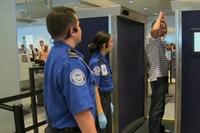-
Students writing their own tickets
Four students at the University of New South Wales say they have cracked the secret algorithm used in Sydney’s public transportation system, which will allow them to print their own tickets
-
-
Improving the sensitivity of airport security screening
Scientists are reporting a simple way to improve the sensitivity of the test often used to detect traces of explosives on the hands, carry-ons, and other possessions of passengers at airport security screening stations; scientists concluded that swab fabrics could be improved to collect smaller amounts of explosives by peppering them with hydroxyl, phenyl and amine functional groups
-
-
Face-recognition e-Gate at Amsterdam airport moving passengers at rapid pace
E-Gate, the automated border control system developed by Accenture and Vision-Box for the Netherlands Ministry of Internal Affairs, is on target to process its one-millionth passenger at Schiphol Airport in December
-
-
Improving high-speed rail ties against freezing, thawing conditions
Research project is helping high-speed rail systems handle the stress of freezing and thawing weather conditions; the 3-year study looks at the freeze-thaw durability of concrete railroad ties; the research is essential to developing safe and durable high-speed rail systems
-
-
TSA replaces backscatter scanners with millimeter wave scanners at some airports

TSA is replacing some backscatter scanners at large U.S. airports with millimeter wave scanners; backscatter scanners were criticized for violating travelers’ privacy, and risking travelers’ health by emitting high levels of radiation
-
-
CNN commentator complains of inappropriate TSA pat down
A CNN commentator says she was molested by TSA agents when a routine security pat-down ended with federal agents repeatedly touching her private parts and refusing her a public screening
-
-
The human factors in airport security
The capstone event, which will be held in Brussels on 29-30 November, will conclude three years of extensive research conducted in European airports
-
-
Associated Aircraft Group awarded authorization for Reagan National Airport operations
Associated Aircraft Group (AAG), which calls itself the East Coast’s largest executive Sikorsky S-76 helicopter services provider, has been granted access into Ronald Reagan Washington National Airport (DCA) by the Transportation Security Administration (TSA) under the DCA Access Security Program (DASSP)
-
-
New Jersey “Texting against Terror” program a success
A $5.8 million federally funded program allowing New Jersey Transit commuters to “text against terror” has received 307 tips to the agency since the program started in June 2011; of those 307 messages, seventy-one have “referred to something regarding homeland security,” said Christopher Trucillo, chief of N.J. Transit Police
-
-
Small airports face reduction in TSA funding for security measures
The Transportation Security Administration (TSA) is reducing funding designated to help smaller airports provide law enforcement officers at passenger screenings; since the 9/11 attacks, the TSA mandated that one law enforcement officer be present when commercial passengers are screened at airports; the TSA has now changed the way it circulates funding for this program, reducing the number of hours an officer has to work and the amount he or she will be paid
-
-
Boarding gate with built-in explosives detection speeds up airport security checks

Japanese researchers have developed a boarding gate with built-in explosives detection equipment; the gate collects minute particles which have affixed themselves to IC cards or portable devices used as boarding passes, and can detect within one or two seconds the presence of explosive compounds using internalized equipment; the developers say the gate allows the inspection of 1,200 passengers per hour
-
-
BART to adopt earthquake early warning system
Thanks to assistance from the Berkeley Seismological Laboratory, the San Francisco Bay Area Rapid Transit (BART) system can now automatically brake trains when earthquakes threaten to rattle the Bay Area, allowing perhaps tens of seconds to a minute for trains to slow down before the ground starts to shake
-
-
As maritime security rises, pirate attacks are down
In the past four years Somali pirates have attacked 800 ships and taken 3,400 people hostage. Now shipping companies which regularly go through the Indian Ocean are fighting back by hiring private security, and the scales have tipped
-
-
Radiation-enabled computer chips allow low-cost security imaging systems
With homeland security on high alert, screening systems to search for concealed weapons are crucial pieces of equipment; these systems, however, are often prohibitively expensive, putting them out of reach for public spaces such as train and bus stations, stadiums, or malls, where they could be beneficial; until now
-
-
More traffic deaths following 9/11
In the wake of the terrorist attacks of 11 September 2001, many Americans started driving more due to a fear of flying — and lost their lives in traffic accidents; why did this happen more frequently in some states than in others? Why did Spanish driving habits not change in the same way following the 2004 train bombings in Madrid? Psychologists offer an answer
-
- All
- Regional
- Water
- Biometrics
- Borders/Immig
- Business
- Cybersecurity
- Detection
- Disasters
- Government
- Infrastructure
- International
- Public health
- Public Safety
- Communication interoperabillity
- Emergency services
- Emergency medical services
- Fire
- First response
- IEDs
- Law Enforcement
- Law Enforcement Technology
- Military technology
- Nonlethal weapons
- Nuclear weapons
- Personal protection equipment
- Police
- Notification /alert systems
- Situational awareness
- Weapons systems
- Sci-Tech
- Sector Reports
- Surveillance
- Transportation
Advertising & Marketing: advertise@newswirepubs.com
Editorial: editor@newswirepubs.com
General: info@newswirepubs.com
2010-2011 © News Wire Publications, LLC News Wire Publications, LLC
220 Old Country Road | Suite 200 | Mineola | New York | 11501
Permissions and Policies
Editorial: editor@newswirepubs.com
General: info@newswirepubs.com
2010-2011 © News Wire Publications, LLC News Wire Publications, LLC
220 Old Country Road | Suite 200 | Mineola | New York | 11501
Permissions and Policies
